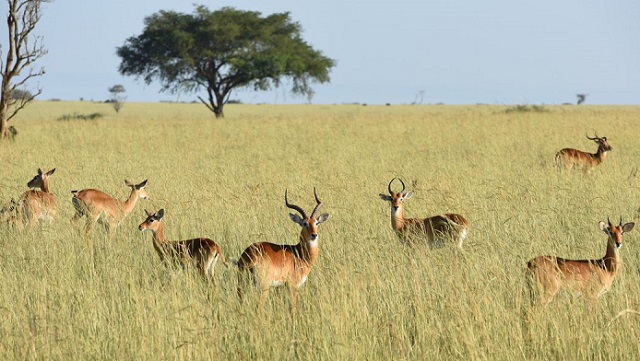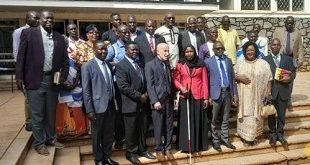
Northern South Africa, South Africa | AFP | The charity pick-up truck rolled into a rural South African township laden with the usual boxes of bread loaves and assorted vegetables — and an unusual and especially prized gift: more than 50 kilogrammes (110 pounds) of fresh venison.
The antelope had been shot a few days prior by game farmers whose tourist lodges were shuttered at the start of an anti-coronavirus lockdown in March.
“I can’t remember the last time I bought meat,” township dweller Tebogo Mabunda exclaimed, clutching a bag of dark red venison cuts and a small sack of potatoes.
Since the tourist industry came to a standstill, Mabunda has been unable to find the odd jobs in nearby lodges and spas that usually allow the town’s thousands of informal workers to scrape by.
With four mouths to feed, the 40-year-old admitted she could now barely afford soap and maize flour, a staple in South Africa.
“When I get a little bit of money I buy potatoes and tomatoes,” said single mother Sarah Baloyi, who lives in a corrugated iron shack with her toddler.
“But unfortunately I can’t even get that because there is no work.”
Faced with growing demands for food donations, local supermarket owner Piet* started processing culled wild animals in his butchery for those in need.
“Previously farmers donated excess potatoes to us,” he explained. “One day I went culling animals with a couple of farmers and thought: what will you do with it?”
Piet has since asked several lodges in the area to donate their animal carcasses to his store.
Through a network a charities, they have distributed more than 1.5 tons of venison to the community over the past two months.
“In times like these receiving a decent protein goes a long way,” Piet said. “It breaks the habit of eating bread every day.”
– ‘Plain hunger’ –
Hunter Pat* cocked his rifle and hit a solitary impala ram straight between the eyes, knocking the animal dead to the ground.
“Nice shot,” said his father Coenrad*, whose name has likewise to been changed to preserve anonymity, driving up to the twitching body as the sun rose over a cluster of acacia trees.
Pat lit a cigarette and looked out at the family’s 200-hectare (500-acre) property, where tourists can take a break from the city and admire wild animals from their chalet windows.
With all reservations cancelled through to August, Coenrad decided to cull 100 antelope to help feed the township — more than double the usual amount.
“Just after lockdown started, problems immediately surfaced next door,” Coenrad said, adding that animals on the neighbouring farm were being poached for food.
“It’s plain hunger,” he explained. “The township was already on knife’s edge… What happened with coronavirus is just pushing it over the top.”
Only four of 33 employees were still working on the farm, mainly to patrol the property and check fences for breaches — a precaution that was stepped up due to increased poaching under lockdown.
While Coenrad has continued to pay all his workers, he admitted lay-offs were “in the pipeline”.
“We are very hard hit,” he said. “Our turnover is virtually zero.”
South Africa’s domestic tourism season is so far only expected to reopen in December. International travellers may have to wait until 2021.
The country has the highest number of confirmed coronavirus cases in Africa, with 25,937 infections and 552 fatalities recorded to date.
– Struggles ‘across board’ –
“It’s a poor town, our economy is broken… and there is a need for food,” said Piet, as reduced supermarket staff sorted through a batch of fruit and vegetable donations.
“Our main source of income is tourism… and now there is nothing across board.”
Back at the lodge, Pat noted that the only upside to the absence of tourists was more leeway for animal culling.
“Guests don’t appreciate shooting,” he said. “Normally we are sneaky… but now we can do it more openly.”
South Africa’s lockdown has also coincided with the start of the hunting season — causing the value of animals to plummet as farmers seek to get rid of surplus that would normally be shot.
The auction price of a live impala has halved to 1,500 rand ($85), while venison has dropped from 30 to 15 rand per kilogramme (from 80 cents / 70 euro centimes to 40 cents / 35 centimes per pound).
Piet hoped the plunging prices would prompt hunting farms to donate surplus rather than sell.
But their response has been mixed and most of the venison he receives has come from smaller family-run lodges rather than larger concerns.
“(Animals) are a livelihood that they are sacrificing,” he shrugged. “They need to be remain economically viable.”
– Political meddling –
Despite efforts to scale up the venison scheme, Piet and his charity partners have sought to avoid the attention of local authorities.
Several incidents of corruption have been reported across South Africa since the start of the lockdown, with government officials allegedly hoarding food parcels for personal and political use.
“Corruption in the government is very easy,” said charity worker Majozy*, who distributes donations collected by Piet’s supermarket.
“They register people and say they are going to get food (but) by the time they have to deliver we don’t see much happening.”
Several township residents told AFP they had not yet received food parcels from local councillors.
Provincial government spokesman Witness Tiva said measures had been taken to exclude councillors from food distribution and eliminate delays.
“The government should be looking after the people,” resident Eva Ngobeni complained. “(Without the supermarket) we would be starving to death.”
Piet said he had already been approached by party officials seeking to take over the meat distribution scheme for “political posturing”.
“Why should I allow it?” he asked. “The more people involved, the more pilferage there will be.”
Coenrad echoed his concern, preferring to remain “low-key”.
“We don’t need the publicity,” he said. “If you go public, you will get problems.”
 The Independent Uganda: You get the Truth we Pay the Price
The Independent Uganda: You get the Truth we Pay the Price


